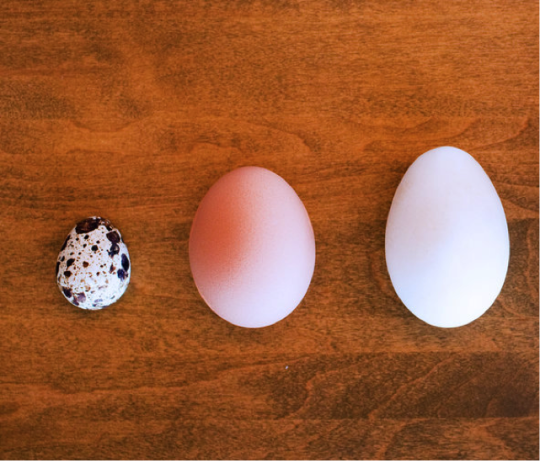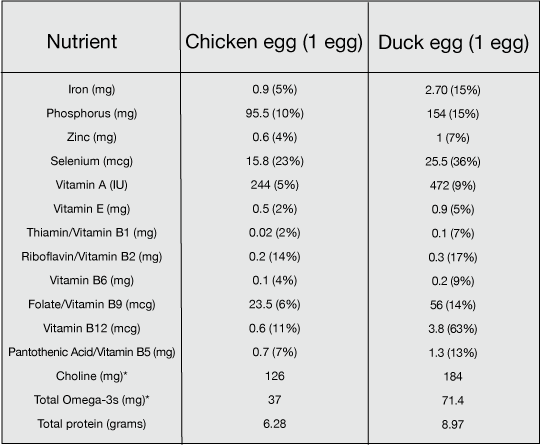
Which Egg Is Right for You?
- Nutrition in all sizes
- Brown or white: putting the shell color myth to rest
- Are you skipping the most nutritious part of the egg? Find out…
Dear Reader,
Ahh, Easter time.
A time when chocolate bunnies, marshmallow chicks, jellybeans, and colored eggs invade the homes of many Americans.
But during this time of confectionary animals and sugar-loaded snacks, eggs (of bird origin, not the crème-filled type) maybe the only healthy food in sight this weekend.
And while all eggs are of high nutritional value, there are some differences among the bird varieties.
Today, just in time for Easter and the beginning of spring, Living Well Daily will breakdown the nutritional benefits of different types of eggs.
Let’s get started:
![]() Quail Eggs
Quail Eggs
Because of their pleasant taste and bite-sizedness, quail eggs are becoming more and more popular. Quail eggs are found on the menus of all types of restaurants, from high-end gourmet to your local sushi joint.
Possibly the tiniest in size of commonly eaten eggs, these little shelled gems still pack a powerful nutritional punch at fraction of the calories (just 14) of other eggs. And like other types of eggs, quail eggs are full of amino acids, vitamins, and minerals. However, you may have to eat a few more to get a high dose of these, as they weigh only 0.3 ounces and have just 1.2 g of protein each.
Quail eggs also have more cholesterol than most eggs due to their yolk-to-white ratio. A serving of five quail eggs has about 380 milligrams.
![]() Chicken Eggs
Chicken Eggs
Chicken eggs are a refrigerator staple for most of us and a likely addition to a dessert recipe or the star of our breakfasts. But how much nutrition are really getting from the common chicken egg?
Turns out, a lot.
Chicken eggs are chock-full of zinc, potassium, and phosphorus. In addition, chicken eggs supply you with calcium and lots of vitamins, including Vitamin A, E, B1, B2, and D. In fact, chicken eggs are one of only a few foods considered to be a good source of vitamin D.
In addition, one chicken egg contains about 65 calories and 14 percent of your daily allowance for protein, as well as the eight basic amino acids your body needs to be healthy.
Though there is some controversy over which color chicken egg is more nutritious, there is no nutritional difference in the colors.
Nutritional value depends on other factors, which will get to in a bit.
A quail egg, chicken egg, and duck egg. Photo credit: NPR. org
![]() Duck Eggs
Duck Eggs
While duck eggs were once at the top of the roost for many cultures, chicken eggs have all but replaced them.
One reason for this is salmonella. Duck egg shells are more porous than those of chicken eggs, which increases the chance of infection. However, duck eggs are perfectly safe for consumption as long as they are stored in a sanitary environment.
In some circles, duck eggs are considered the “Cadillac” of eggs when it comes to nutrition. Check out this chart below to see the nutritional differences between chicken eggs and duck eggs:
Table from paleoleap.com
Keep in mind that one reason for its increased nutrients is because of its size — duck eggs are about 30% larger than chicken eggs and 130 calories each.2
![]() Hatch Your Plan
Hatch Your Plan
As you can see, all three eggs have something different to offer nutritionally. It’s up to you to make choose which one best meets your nutritional needs and is available in your area.
Chicken eggs aren’t hard to come by. However, you may have to visit a specialty store or farm stand to find quail and duck eggs.
Whichever egg you choose, be sure you’re buying free-range and organic eggs for optimal nutrition. This ensures the laying birds have access to the outdoors, where they can peck for insects and grubs, and access to organic supplemental feed free of pesticides, herbicides, and GMOs.3
And when you go to eat them, don’t skip the yolks. Yolk, of all varieties are a good source of micronutrients and omega-3s. Egg whites on the other hand, are just empty proteins with little added nutritional value.

Natalie Moore
Managing editor, Living Well Daily
Sources
[1] Different Types of Eggs and Their Nutritional Value
[3] Best Eggs: Organic, Free-Range, or Conventional?
Written By Natalie Moore
Natalie Moore is a dedicated health researcher with a passion for finding healthy, natural, and science-based solutions. After a decade of direct healthcare experience in western and natural medicine, she was involved in public health research before joining Living Well Daily.
View More Free Articles
Stop Obsessing Over Diet Trends
Can we stop with the endless diet debates already? Every other week there’s a new headline shouting about which diet is best for weight loss, heart health, or diabetes. Paleo, keto, low-carb, high-protein… it’s exhausting. And now, a new meta-analysis is out comparing the Mediterranean diet, the DASH diet, and something called AHEI (that’s “Alternative...
A New Reason to Ditch Processed Junk
If you’ve ever walked the inside aisles of your local grocery store and thought, “This is all just junk,” your instincts were spot on. A new study published in the journal Thorax just added another red flag to the list of dangers linked to ultra-processed food—a 41 percent higher risk of lung cancer. That’s right....
When Being Winded on Stairs Is Serious (And When It Isn’t)
I had an athlete visit me recently because he experienced shortness of breath while climbing stairs. He is in great shape, so he was worried about what it might mean. “Doc,” he said, “I run five miles three times a week. Why am I huffing and puffing after two flights of stairs?” His concern is...
Study EXPOSES Hidden Danger Lurking in Your Car
We think of our homes and cars as safe havens. But according to a startling new study, they may be flooding your lungs with microscopic plastic particles—every single day. Researchers in France recently found that adults inhale an average of 68,000 microplastic particles daily from indoor air alone. To put that in perspective, that’s about...
Mailbag: Is Modern Food Making You Snore?
“What can cause snoring, and is there a way to correct this issue?” —Seeking Silence Hi Seeking, Snoring happens when the soft tissues in your throat relax and vibrate as air passes through during sleep. While several factors can cause snoring—from sleep position to nasal congestion—I want to share one trigger that might surprise you....
Simple Food Swap SLASHES Dementia Risk 28%
Let’s be honest… who would jump at the chance to cut their dementia risk by 28 percent. And no, you don’t need to run marathons, survive on broccoli, or learn to play the zither (whatever that is) to make it happen. All it takes is one easy swap—something that’s probably already in your refrigerator. Researchers...
This SMART Floss Exposes Hidden Health Danger
Scientists have created dental floss that doesn’t just clean between your teeth—it also tracks your stress while you’re flossing. Now, I know what you’re thinking… “Great—now even flossing is going to stress me out by telling me how stressed I am.” But this fascinating new tool from Tufts University could be a game-changer for understanding...
Is This "Safe" Sweetener Damaging Your Brain?
The headlines are alarming… “Popular Sugar Substitute Linked to Brain Cell Damage” and “Erythritol Could Damage Critical Brain Barrier” are just two of the dozens I’ve spotted recently. But before you toss every sugar-free product in your pantry, let’s take a closer look at what this study actually shows—and what it doesn’t. The latest research...
This Summer Threat Could SPIKE Your Blood Sugar
Picture this… It’s another scorching hot summer day. You crank up the air conditioning while watching the weather forecast, which predicts yet another “record-breaking” heat wave. It’s starting to feel like just another miserably uncomfortable summer. But what you might not realize is that—if you have diabetes—those rising temps could do far more damage to...
Move Over Yogurt—5 Foods That Pack MORE Probiotics
Let’s talk about your gut. The microbiome is the collection of trillions of bacteria and other tiny organisms that live in and on your body—especially in your gut—and help keep you healthy. I’ve written often about how vital it is to maintain a healthy microbiome. And you might have dutifully added yogurt to your shopping...











